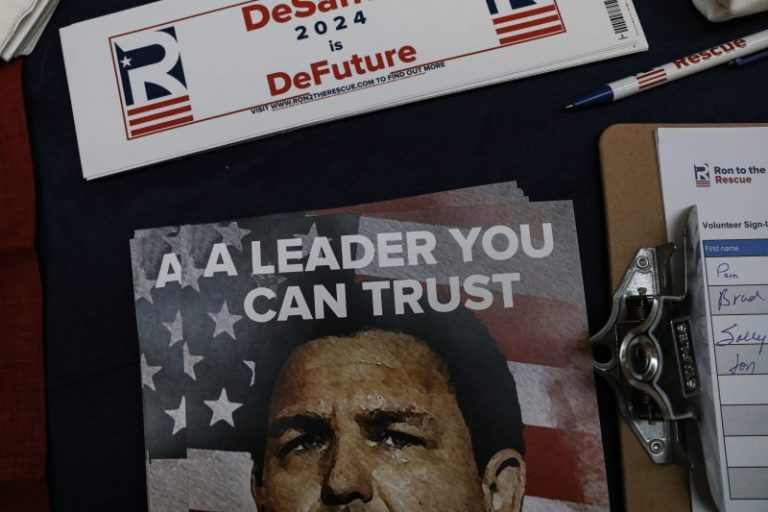President Biden visited Warsaw on Tuesday to deliver an increasingly time-sensitive message about Russia’s year-old invasion of Ukraine.
“Putin no longer doubts the strength of our coalition. But he still doubts our conviction. He doubts our staying power. He doubts our continued support for Ukraine,” Biden said in the Polish capital, adding that “there should be no doubt.”
But even as he was delivering that message, the American right’s rift over the issue has been coming into focus. Ambitious 2024 presidential hopefuls have begun in recent days to stake out strikingly divergent positions on the matter.
On one side is former Trump administration United Nations ambassador Nikki Haley. She has spoken about Russia and Ukraine in terms that will be familiar to observers of conservative foreign policy earlier in the 21st century.
“It’s not a war about Ukraine; this is about a war on freedom,” she told an audience member last week in Exeter, N.H. “Because if Russia takes Ukraine, they said Poland and the Baltics are next, and we’re looking at a world war. And if Russia wins, you can bet China’s gonna take Taiwan, Iran’s gonna get the bomb.”
Haley very much echoed the likes of Senate Minority Leader Mitch McConnell (R-Ky.). McConnell has argued against his party’s noninterventionist turn with increasing frequency, saying that supporting Ukraine is in America’s interest and provides a relatively low-cost opportunity (domestically, at least) to combat a leading adversary.
But by Monday morning came a reality check about where the ascendant portion of the GOP is going. Potential 2024 candidate and Florida Gov. Ron DeSantis (R) offered almost a polar-opposite take, appearing to move toward former president Donald Trump’s more hands-off posture toward the war.
“I don’t think it’s in our interest to be getting into a proxy war with China, getting involved over things like the borderlands or over Crimea,” DeSantis said on Fox News. He added: “It’s important to point out the fear of Russia going into NATO countries and all of that and steamrolling that is not even coming close to happening. I think they’ve shown themselves to be a third-rate military power.”
It was a significant contrast not only to the messages of Haley and McConnell, but to how DeSantis himself used to talk about these issues.
As a founding member of the House Freedom Caucus, then-Rep. DeSantis often staked out hawkish positions on Russia and Ukraine, pointing to the Obama administration’s inaction after Russia’s 2014 annexation of Crimea from Ukraine.
At a 2014 hearing, DeSantis warned that Putin’s justification — that Crimea was largely composed of ethnic Russians — could be extended to other nations and even some NATO members such as Latvia and Estonia. He pressed an Obama State Department official to confirm that the United States would defend those countries from a Russian incursion, as is the U.S. commitment under Article 5 of the NATO charter.
In a 2015 interview on Fox Business Network, DeSantis criticized Obama for not giving Ukraine both defensive and offensive weapons, saying, “If you had a Reagan-esque policy of strength, I think you would see people like Putin not want to mess with us.”
At a 2017 hearing on Russia, DeSantis criticized the lack of action after Putin went into both Crimea and Georgia, saying, “Russia expanded its influence over the eight years of the Obama administration in malevolent ways.”
Crimea remained a focal point in 2018, when DeSantis told Fox News’s Sean Hannity, “They did nothing when Russia invaded Crimea, made incursions into Ukraine, went into Syria.” (DeSantis also used the interview to praise Trump’s choice of uber-hawk John Bolton as national security adviser.)
That same year, during an event at Embry-Riddle Aeronautical University, DeSantis expanded on his view of the costs of inaction in the face of Putin’s aggression.
DeSantis said Putin “wants to reconstitute the Russian Empire,” and, “I think that he’s been a threat for a long time.” DeSantis even gently chided then-President Trump for speaking positively about having a relationship with Putin: “You’re better off dealing with Putin by being strong. … When Putin sees he can gain an inch, he’s apt to take a mile. And basically, if America’s not going to give him any pushback, I think he’s going to continue to try to expand Russian influence.”
Certainly, we have learned plenty since then about Russia’s military capabilities. But even accounting for that, the downgrading of Russia as a threat in DeSantis’s commentary — and in much of the GOP’s — is immense. And it’s worth considering to what extent Russia has been thwarted precisely because of Western support for Ukraine.
It’s also nearly irreconcilable with how the likes of Haley and McConnell continue to talk about Ukraine and Russia today. The one talking point that appears to unite the GOP for now is opposition to a “blank check” for Ukraine — which both Haley and DeSantis emphasized. But that’s a largely meaningless rhetorical device; Biden has emphasized that there’s no blank check involved because the United States isn’t giving Ukraine everything it wants. The more significant differences between these positions — given this could involve the next commander in chief and future spending debates — concern what level of importance the candidates ascribe to the war.
If the early days of the 2024 GOP primary are any indication, there could be a sizable gulf on the debate stage — with the course of our continued support for Ukraine hanging in the balance.

